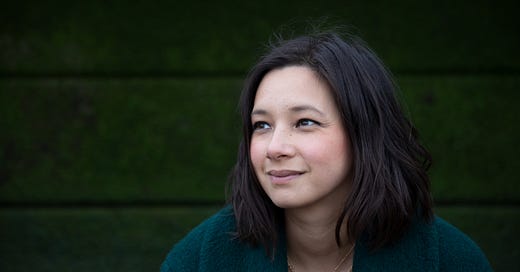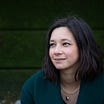Amélie Skoda: “My name is my only connection to an invisible part of my identity”
The author on active choices, keeping hold of connections and extra layers of mixedness
Hi, welcome back to Mixed Messages! This week’s guest is author Amélie Skoda, who is of mixed-Malaysian and French heritage. Amélie’s debut novel, Bethnal Green, is released this week, following Suyin Lim as she’s offered a chance to train as a nurse in 1970s London. But life in Bethnal Green isn’t quite as she imagined, with unexplained ghosts of her sister’s own experiences, and Suyin’s path isn’t quite as well-lit as she hoped. Read Amélie’s story below.
How do you define your identity?
I usually explain to people that my dad is French and my mum is Malaysian, and that I have always lived in the UK, which feels like the most accurate way of giving people an overview of my background. I’ve been asked where I’m from so much in my life and not really known how much detail to go into or what people are really asking me. I used to feel more defensive, as if I had to prove myself. Now I feel much more proud to just not feel those pressures.
When I was younger, I felt like I had to say “half-French, half-Malaysian.” Now I catch myself, because saying “half” feels quite damaging, suggesting people with mixed heritage aren’t wholly any of their heritages. It’s also reductive, excluding nuances like the fact that my dad’s dad was Czech.
I feel like people would comment on me having a European-sounding name when I was younger. One of the many reasons I wanted to keep my own name when I got married was because that's my only connection to an otherwise invisible part of my identity. That feels important to me. I really wanted to give both my children a Chinese middle name, as well as their more European sounding first names. When you go to fill out those forms, it’s nice to write all the names on there.
Bethnal Green follows Suyin coming to the UK from Malaysia to train as a nurse – are there echoes in the story of how your own parents met?
It's not exactly how they met, but there are echoes. My parents came to this country to work and study, met here and decided to stay. The reasons why they chose to stay in this country have always been very intriguing to me. If you’ve immigrated to a different country, that's a question you have to answer to yourself all the time.
It’s an active choice to stay. What is it that makes a different country feel more like your home, like you belong here and want to put down roots? Those questions were on my mind when writing. I wanted to show that love can be a political choice, looking at the freedoms Suyin appreciates in this country and the choices she makes about what she's going to do with her life and who she's going to spend it with.
Equally, I respect that for couples from different places, particularly back in the ‘70s, what your family wanted for you versus what you wanted for yourself could be quite different. How can you square that, be free in the ways that you want without losing connection to past traditions, even if they’re not ones you want to live by?
What cultural influences did you grow up around?
I feel lucky that both my parents made a massive effort to make their cultures a big part of our home life. English was the common language spoken at home, but my dad taught me French and read French books to me every night and we’d visit family in France.
Despite the distance, I’ve always felt very deeply connected to my Malaysian heritage too, which I’m so grateful for. Both are home to me because I was able to spend time there when I was younger.
My mum was great at telling me about Malaysian culture and food. The section of Bethnal Green where Suyin is shopping in Chinatown was one of my favourites to write because it was based on my own memories with my mum. I felt at home at Asian supermarkets.
How are you ensuring your children stay connected to their cultures?
Traditions are really important. We always celebrate Lunar New Year, taking them to some sort of event. I’ll cook something like a steamboat or hot pot, which I grew up with as being a special, celebratory meal.
I didn't grow up speaking Hokkien or Malay, which is a shame, but when I go back I can understand odd words. I’m trying to teach my kids French, reading to them like my dad did for me. We go back to France as often as we can. I’m glad the next generation is growing up in a society that feels more free, where they are able to be themselves and express themselves as they wish.
Have you noticed any stereotypes around mixedness throughout your life?
There’s an assumption that mixed people have one parent that isn’t from this country and one that is. Not having a parent native to this country was an extra layer.
Do you think that being mixed led you to feel more interested in how people got to where they are today?
Definitely. Having access to different cultures does make you more curious about how other people live. I have always been really curious about what lies behind people's decisions, the different paths they choose to take in life.
Being mixed can be a source of confusion, with feelings of not belonging, but equally it can be a real strength. You’re able to appreciate different worlds at the same time – that’s really special.
What’s the best thing about being mixed for you?
The massive privilege of having two or more cultures or communities that you can feel part of. It does make you a lot more open. I’m very open to understanding other people’s cultures. Maybe it gives you more empathy, perhaps because you know what it’s been like for your parents.
Over the years, I’ve managed to set aside feelings of inadequacy that I think are foisted on mixed people a lot. Now, I think it’s amazing. It’s been a bumpy road – when you don’t fit into a certain box or definition, you have a more heightened sense of how people perceive you, but also how you might perceive others and how that doesn't necessarily match up very well.
It's really important to have a sense of your own identity, to give yourself the chance to feel proud and appreciate it for what it is. It’s very easy for people who have multiple different heritages to feel like they’re not enough, or like they haven’t made enough of an effort to be part of something. I don't think that's helpful. You are completely each [of your heritages,] there's something very special and unique about that.
Can you sum up your mixed experience in one word?
Belonging. For a long time, I felt like I didn't belong anywhere. I wasn’t seen as fully this or that. Now I feel lucky to belong in lots of places and to feel equally at home. They're all equally important parts of who I am.
Next week, I’ll be speaking to comedian and writer Athena Kugblenu. Subscribe to get Mixed Messages in your inbox on Monday. Shop Mixed Messages tote bags and bookmarks on Etsy now.
Enjoy Mixed Messages? Support me on Ko-Fi! Your donations, which can start from £3, help me pay for the transcription software needed to keep this newsletter weekly, as well as special treats for subscribers. I also earn a small amount of commission (at no extra cost to you) on any purchases made through my Bookshop.org and Amazon affiliate links, where you can shop books, music and more by mixed creators.
Mixed Messages is a weekly exploration of the mixed-race experience, from me, Isabella Silvers. My mom is Punjabi (by way of East Africa) and my dad is white British, but finding my place between these two cultures hasn’t always been easy. That’s why I started Mixed Messages, where each week I’ll speak to a prominent mixed voice to delve into what it really feels like to be mixed.









